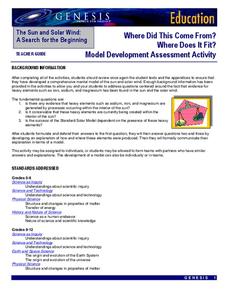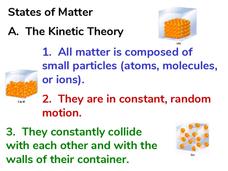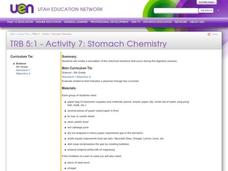Polar Trec
Down to the Deep Virtual Lab
At a depth of 3,000 m in the ocean, the pressure is 300 times that at sea level! In the activity, individuals predict what will happen to Styrofoam cups submerged 3,000 meters into the ocean. They then convert these units to soccer...
NASA
Model Development Assessment Activity
Time to show off what they've learned! The final lesson in the series of six asks young scholars to process their learning from the previous lessons. They identify possible elements of the sun as well as a possible origin.
Wild BC
The Greenhouse Effect: Warming the Earth Experiment
First in a two-part lesson on the greenhouse effect, this lesson involves a classroom demonstration of the phenomenon, and a lab group experiment with color and absorption. Although there are easier ways to demonstrate the greenhouse...
NASA
Determining the Nature, Size, and Age of the Universe
Prompt scholars to discover the expansion of the universe themselves. Using photographs of other galaxies, they measure and then graph the size and distance of each. Finally, they draw conclusions and prove the universe is expanding.
NASA
Supernova Chemistry
By measuring the wavelength, frequency, and intensity of electromagnetic radiation, scientists determine the temperature, density, and composition of far away items. Scholars rotate through ten lab stations using a spectroscope at each...
Purdue University
Design of a Door Alarm
How does electricity work? Budding scientists explore the concepts of electrical currents and open and closed circuits with class discussion and a hands-on activity using a battery to turn on a light bulb. Learners also make predictions...
Curated OER
Exploring Buoyancy
Students use materials found at a resource table to design simple devices that will house instruments to take water samples from a tub of water. They design 3 instruments, each varying in density so that one will float, one will hover...
Alabama Learning Exchange
Float or Sink?
Experiment with mass and density as scholars figure out what makes things float or sink. First, they watch a podcast introducing these concepts. Be sure to use the comprehension question to test their understanding. Young scientists...
California Academy of Science
Carbon Cycle Role Play
Anytime you make concepts clear with role playing or hands-on experience, it's a win for the whole class. Ping-Pong balls are used to represent carbon in a carbon cycle role-play activity. In small groups, children first discuss what...
Curated OER
Lead and Mercury Ion Catalase Inhibition
Students participate in a laboratory investigation in which they observe the effect of temperature and pH on enzyme activity. Students also examine exposure to heavy metal ions and the effect that may have on enzyme activity.
Curated OER
Fingerprinting Lab
Learners recover latent prints by iodine fuming, cyanoacrylate fuming, and dusting with powder, after a lecture/discussion on fingerprinting techniques. They each provide a fingerprint for identification by another student. A database of...
Curated OER
Properties of Fresh and Sea Water
Learners work with three stations to demonstrate the properties of water. They explore water's boiling point, freezing point, and its ability to store heat.
Curated OER
The Nature of Salt
High schoolers record information from the periodic table for sodium and chloride. They determine whether salts are molecular or ionic compounds, along with sodium chloride's molecular weight, and relative weights
Teach Engineering
Equal and Opposite Thrust in Aircraft: You're a Pushover!
It's the law—every action requires a reaction, no matter how small. Pupils experience two demonstrations of Newton's third law of motion as it relates to thrust in the 10th segment of a 22-part unit on flight. Using their mathematical...
Curated OER
Polymers all Over the Place
Students investigate properties of common molecules. In this chemistry lesson, students construct polymer models to gain a better understanding of the properties of polymers.
Curated OER
Resources - A Reading Guide
In this resources worksheet, students compare and contrast physical and chemical properties and changes. Students review the periodic table, pattern of atomic numbers and chemical reactivity. This worksheet has 56 short answer questions.
Curated OER
Water and Ice
Students study the water cycle and states of matter. In this water cycle lesson, students observe ice for a period of time and record their observations. Students create a Venn Diagram comparing water in solid form and liquid form....
Curated OER
States of Matter
This particle PowerPoint includes many pictures to illustrate solids, liquids and gasses and the behavior of their particles.
Utah LessonPlans
Stomach Chemistry
Students will create a simulation of the chemical reactions that occur during the digestive process. A physical change occurs when the appearance of matter changes, but the composition of the matter does not change.
Curated OER
Floating Soap
Students explore the density of soap. In this science lesson, students conduct an experiment to find which types of soap will float. Students make a hypothesis and record their observations.
Curated OER
Differentiate Elements, Compounds, and Mixtures
Students examine the differences between elements, compounds and mixtures. Using diagrams, they compare and contrast atoms and molecules and describe various chemical reactions. They distinguish the differences between ionic and...
Curated OER
Poster Assignment: Sports Chemistry
Tenth graders distinguish between chemical and physical properties and changes in matter when given specific examples. They view a video of sports activities. Students chose their favorite sport and design an experiment to improve sports...
Curated OER
Transformations of Energy
Seventh graders investigate the relationship between energy and matter, and measure the mass of various objects. They listen to a teacher-led lecture about potential energy, and in small groups measure the mass of various objects such...
Curated OER
Space and Time in Dance
Students move with control in general space. They move with three different spatial distances and tempi. Students demonstrate understanding of the distance and speed of particles in matter: solid-close and slow; liquid-medium distance...

























